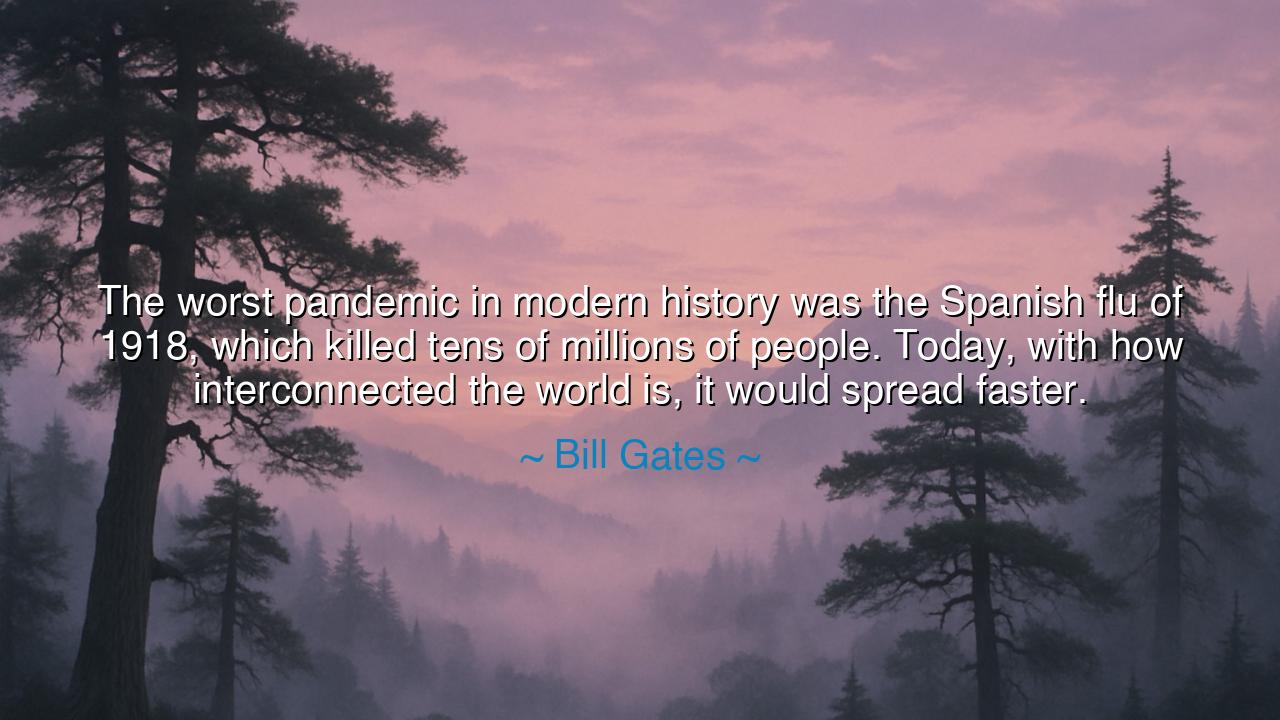
The worst pandemic in modern history was the Spanish flu of 1918
The worst pandemic in modern history was the Spanish flu of 1918, which killed tens of millions of people. Today, with how interconnected the world is, it would spread faster.






When Bill Gates, the visionary of our age, declared, “The worst pandemic in modern history was the Spanish flu of 1918, which killed tens of millions of people. Today, with how interconnected the world is, it would spread faster,” he spoke not merely as a man of science, but as a seer of human fragility. His words are both a remembrance and a warning — a mirror held before civilization, reminding us that progress does not free us from vulnerability, but often multiplies it. For though the tools of our age have bound continents together, they have also made the world a single body — one breath, one pulse, one wound.
The origin of this quote lies in Gates’s long-standing concern for global health and preparedness. In the years before the COVID-19 pandemic, he stood before nations and leaders, urging them to recognize that the next great threat to humanity would not come from bombs or borders, but from disease — unseen, silent, and swift. Drawing upon the lessons of the Spanish flu of 1918, he reminded the world that this catastrophe struck when humanity was far less connected than it is today — and yet, it swept through cities and villages with terrifying speed, claiming over fifty million lives. Gates saw, with chilling clarity, that in an era of international flights and dense cities, such a plague would travel the world in hours, not months. His warning was not prophecy, but reason — the logic of history repeated through the rhythm of time.
To understand his words, one must first understand the Spanish flu, that dark wind of the early twentieth century. It came in the aftermath of war, when the world was weary and broken. Soldiers returning from the trenches carried death upon their breath; communities unprepared for the unseen foe fell like fields before the frost. Entire families perished within days; cities fell silent; the young and strong, who had survived war, succumbed to fever. And yet, through it all, there was courage — doctors and nurses who labored until they collapsed, neighbors who shared food and comfort when all seemed lost. The Spanish flu was not only a tragedy; it was a testament to the endurance of the human spirit.
Gates’s warning thus carries both memory and foresight. He speaks to an age that moves faster than thought, where planes cross oceans in the span of a meal, where commerce and travel have erased the old barriers of time and space. The same networks that spread knowledge and opportunity can also spread contagion. A single cough on one continent may, within days, echo in the lungs of another. In this interconnected world, humanity shares not only its triumphs but its vulnerabilities. Gates’s words remind us that progress without preparation, and connection without compassion, can become our undoing.
History vindicated his wisdom when, in 2020, the world faced COVID-19 — a pandemic that swept across nations faster than any in recorded memory. In its wake, the modern world was stripped of its illusions of invulnerability. Planes were grounded, cities fell silent, and nations once mighty trembled before the same invisible adversary that felled their ancestors. Yet even then, amid the fear and loss, there was proof of what Gates had also believed: that knowledge and cooperation could be our salvation. Scientists united across borders; vaccines were crafted in record time; and countless acts of compassion revealed that, though the world is fragile, it is also deeply resilient.
In his quote lies a profound lesson for generations to come. It is not enough to build wealth or technology; we must build wisdom. We must remember that humanity’s strength lies not in its machines, but in its unity — in the capacity to foresee, to prepare, and to protect one another. Just as the ancients built firewalls to guard against invading armies, so too must modern civilization build systems of defense against disease — through science, education, and global cooperation. To ignore the warnings of history is to invite its repetition; to heed them is to shape destiny with foresight and courage.
So, O children of this age, take heed of Bill Gates’s counsel. Remember the ghosts of 1918, and the tears of 2020. Do not mistake the silence between disasters for safety. Invest in the guardians of life — the healers, the thinkers, the scientists — for they are the sentinels who stand between civilization and chaos. Understand that your neighbor’s health is bound to your own, that your safety is tied to the wellbeing of distant lands.
And above all, let compassion guide your progress. For if the world is now one body, then the illness of one limb weakens all. Let foresight be your armor, and kindness your cure. Then, when the next shadow rises — as history promises it will — humanity shall not tremble, but stand united, wiser, and stronger, beneath the shared light of understanding.






AAdministratorAdministrator
Welcome, honored guests. Please leave a comment, we will respond soon